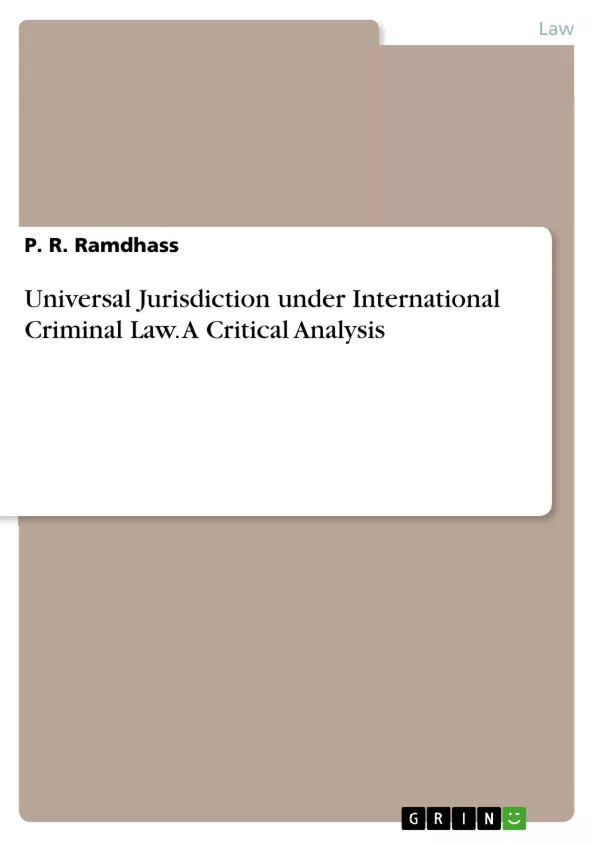The concept of universal jurisdiction evolved out of protecting international commerce, but now it has become a necessity for protecting human values in modern times. Even though the concept is good, its misuse threatens peaceful international relations. The study propose to discuss the legal status of the concept of universal jurisdiction under international law and its conflict with other legal principles like State sovereignty, sovereign immunity and non-intervention. It will also highlight how jus cogens norms and obligatio erga omnes strengthen the concept of universal jurisdiction. Further, the study will discuss the related concepts, such as ‘responsibility to protect’ and ‘extradite or prosecute’.
However, scope of the study will be limited to the problems of universal jurisdiction under international criminal law; and it will not address the issues of active, passive and territorial jurisdictions except to the extent necessary.
Inhaltsverzeichnis (Table of Contents)
- INTRODUCTION
- BACKGROUND OF THE STUDY
- DEFINITION, RATIONALE AND SCOPE
- SCHEME OF THE STUDY
- EVOLUTION OF UNIVERSAL JURISDICTION
- THE CONCEPT OF PIRACY
- AN OPTION INTO AN OBLIGATION
- EXPANSION OF UNIVERSAL JURISDICTION
- DEVELOPMENT OF UNIVERSAL JURISDICTION
- OTHER BASES OF JURISDICTIONS
- APPROACH OF UNIVERSAL JURISDICTION
- Positive Approach
- Negative Approach
- THE PRINCIPLE OF NE BIS IN IDEM
- DIFFERENT STATE PERSPECTIVES
- Debate in the UN General Assembly
- Opinion of the International Committee of the Red Cross
- Opinion of Belgium and Spain
- SOME CASES RELATING TO UNIVERSAL JURISDICTION
- Eichmann Trial
- Arrest Warrant Case
- Pinochet Trial
- EXPERIENCE OF SPAIN AND BELGIUM
- LEGAL STATUS OF UNIVERSAL JURISDICTION
- INTERNATIONAL CUSTOMARY AND CONVENTIONAL LAWS
- International Crimes under Customary International Law
- Conventional International Law
- DOUBLE JEOPARDY AND DOUBLE CRIMINALITY
- ABSOLUTE AND CONDITIONAL UNIVERSAL JURISDICTION
- JUS COGENS AND OBLIGATIO ERGA OMNES
- DOCTRINES IN CONFLICT WITH UNIVERSAL JURISDICTION
- State Sovereignty
- Sovereign Immunity
- PARALLEL DOCTRINES
- Principle of Extradite or Prosecute (EOP)
- Responsibility to Protect (R2P): Origin and Development
- INTERNATIONAL CUSTOMARY AND CONVENTIONAL LAWS
- RESPONSIBILITY, USE AND ABUSE OF UNIVERSAL JURISDICTION
- LEGAL MEANING AND MODES OF RESPONSIBILITY
- State responsibility
- Individual Responsibility
- Joint Criminal Responsibility (JCR)
- Collective Responsibility
- Command or Superior Responsibility
- USE AND ABUSE OF UNIVERSAL JURISDICTION
- Use of Universal Jurisdiction
- Abuse of Universal Jurisdiction
- LEGAL MEANING AND MODES OF RESPONSIBILITY
Zielsetzung und Themenschwerpunkte (Objectives and Key Themes)
This study aims to critically analyze the concept of universal jurisdiction under international criminal law, examining its legal status, its conflicts with other legal principles, and its potential for both use and abuse. The work explores how universal jurisdiction has evolved from its origins in protecting international commerce to its current role in safeguarding human values.
- The legal status of universal jurisdiction under international law
- The relationship between universal jurisdiction and principles like state sovereignty, sovereign immunity, and non-intervention
- The role of jus cogens norms and obligatio erga omnes in strengthening universal jurisdiction
- The responsibility, use, and potential abuse of universal jurisdiction
- The relationship between universal jurisdiction and other concepts like "responsibility to protect" and "extradite or prosecute"
Zusammenfassung der Kapitel (Chapter Summaries)
- INTRODUCTION: This chapter provides an overview of the study, defining universal jurisdiction, discussing its rationale and scope, and outlining the structure of the analysis.
- EVOLUTION OF UNIVERSAL JURISDICTION: This chapter traces the historical development of universal jurisdiction, exploring its origins in the concept of piracy and its evolution into a recognized legal principle. It discusses the expansion and development of universal jurisdiction, as well as other bases of jurisdiction.
- LEGAL STATUS OF UNIVERSAL JURISDICTION: This chapter analyzes the legal basis for universal jurisdiction, examining its roots in customary and conventional international law, and its relationship with principles like double jeopardy and double criminality. It also explores the concepts of absolute and conditional universal jurisdiction, the role of jus cogens norms, and the conflict between universal jurisdiction and principles like state sovereignty and sovereign immunity.
- RESPONSIBILITY, USE AND ABUSE OF UNIVERSAL JURISDICTION: This chapter focuses on the legal meaning and different forms of responsibility under international law, including state responsibility, individual responsibility, joint criminal responsibility, collective responsibility, and command or superior responsibility. It explores how universal jurisdiction can be used effectively and examines the potential for its abuse.
Schlüsselwörter (Keywords)
Key terms and concepts central to this analysis include universal jurisdiction, international criminal law, state sovereignty, sovereign immunity, non-intervention, jus cogens, obligatio erga omnes, responsibility to protect, extradite or prosecute, international crimes, customary international law, conventional international law, double jeopardy, double criminality, and the legal status of universal jurisdiction.
Frequently Asked Questions
What is universal jurisdiction?
Universal jurisdiction is a legal principle allowing states to prosecute individuals for serious international crimes, regardless of where the crime was committed or the nationality of the perpetrator.
Which crimes are covered under universal jurisdiction?
It traditionally covers crimes like piracy, and has expanded to include genocide, war crimes, crimes against humanity, and torture.
How does universal jurisdiction conflict with state sovereignty?
It allows a state to intervene in the internal affairs of another by prosecuting its citizens or officials, which can be seen as a violation of the principle of non-intervention and sovereign immunity.
What are 'jus cogens' norms?
Jus cogens are fundamental principles of international law from which no derogation is permitted, such as the prohibition of genocide, which strengthen the basis for universal jurisdiction.
What is the 'extradite or prosecute' principle?
Also known as 'aut dedere aut judicare', it is an obligation for states to either prosecute a person who committed an international crime or extradite them to a state that will.
Can universal jurisdiction be abused?
Yes, there are concerns that it could be used for politically motivated prosecutions, potentially destabilizing international relations and peaceful diplomacy.
- Arbeit zitieren
- P. R. Ramdhass (Autor:in), 2018, Universal Jurisdiction under International Criminal Law. A Critical Analysis, München, GRIN Verlag, https://www.grin.com/document/437750



